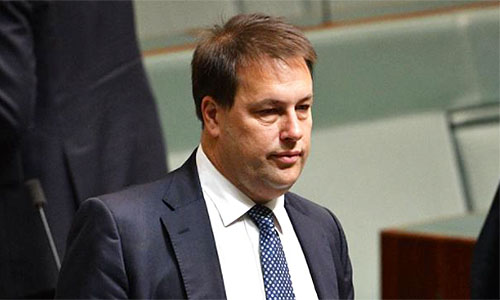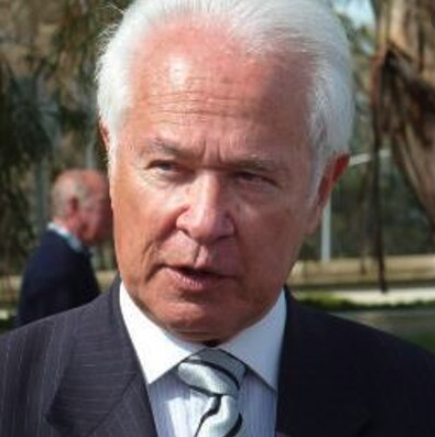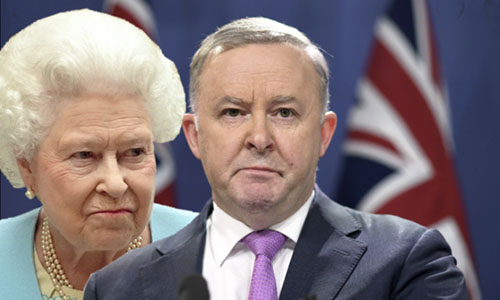
By DAVID FLINT – IN THE nineteenth century, becoming a republic was argued to be the only way Australia could remain a white nation.
In the twentieth century, communists argued that Australia should become a Soviet or people’s republic.
- Australians are not lying awake at night wondering who their head of state is.
- Not one of the three republic models produced can be said to come even close to being “desirable, irresistible and inevitable”.
- The latest offering is a recipe for government instability.
Supporting Australia becoming a republic today should be more than a mere declaration of fashionable moral superiority.
For a responsible citizen, constitutional change should only be supported if it will significantly improve the governance of Australia.
DEBATE
If unsure, they should follow Alan Jones’ advice: “If you don’t know, vote no.”
It is the duty of a responsible media and a sound educational system to ensure that Australians have access to both sides of this over-long debate and are aware of four fundamental points.
First, Australia is already a republic. As even Paul Keating’s Republic Advisory Committee, chaired by Malcolm Turnbull, conceded, Australia can properly be described as a “crowned republic”.
Second, the Westminster system assumes the Crown acts as a necessary constitutional guardian, providing leadership beyond politics.
Third, there is no need for constitutional change to have an Australian as head of state. The term refers to an office under international law and has long been used as a description of the office of governor-general.
As early as 1907, a High Court bench of founders unanimously declared the governor-general the “constitutional head of state”.
And following the landmark 1926 Imperial Conference, all governments, Coalition or Labor, have invariably informed all relevant foreign governments to be visited by the governor-general, that he or she is the Australian head of state.
Australians are not lying awake at night wondering who their head of state is.
Until the Australian Republican Movement (ARM) fell on it, the term was so little known it was not in the Macquarie Dictionary.
Realising it could offer no plausible justification for the massive changes it was proposing, the ARM decided that if an untruth were deceitfully added to a polling question, the affirmative vote could be increased.
EVADE
Hence the question now used by one pollster is: “Are you in favour of Australia becoming a republic with an Australian as head of state?”
Fourth, unlike the poorly drafted Barbados Constitution which allowed politicians to evade a referendum, our founders insisted that the Constitution could only be changed with the approval of the people both nationally and federally, that is in a majority of States, with all the details on the table before, not after the vote.
As explained in a magisterial commentary on the Constitution, this was not to prevent change as such.
It was to prevent change made in haste or stealth, to encourage public discussion and to delay change until there was strong evidence that it is “desirable, irresistible and inevitable”.
Not one of the three republic models so far produced by the ARM can, on any fair judgment, be said to come even close to the threshold of being “desirable, irresistible and inevitable”.
When the first ARM republic model was released in 1998, I warned that it would bring to Australia a French-style fifth republic, mixing an American style presidency with the Westminster system.
As I stressed at the time, the only reason the French had chosen this model was because they could not make either system work.
Only when former Justice and Victorian Governor, Richard McGarvie advanced similar reasons did the ARM withdraw their first republic offering.
This may have been affected by the fact that Malcolm Turnbull’s greatest fear at the Convention was that Australians for Constitutional Monarchy (ACM) would accept misguided advice promoted in opinion pieces in the The Australian and use its numbers to make the “least-worst” McGarvie model the one considered in the referendum.
ARM’s consequential second republic model failed to gain an absolute majority, but John Howard decided that it should be put to the people.
DISREGARD
When the republicans lost the referendum, with blatant disregard for the truth, they accused him of rigging the Convention.
The weakness in the second republican model put forward was reflected in ACM’s rejected proposal to a parliamentary committee that the referendum question describe not only how the president be elected but also the crucial issue of how he would be dismissed.
Unlike any other republic in history, the president could be dismissed by the prime minister without notice, without any grounds, without any right of appeal, thus reducing him or her to being the PM’s puppet.
Incidentally, Mr Turnbull asked for two words in the question be deleted, “president” and, believe it or not, “republic”.
Apparently his focus groups were not excited by the word “republic”.
As long predicted here, the ARM’s third republican model is for an elected president stripped of the reserve powers, a politicians’ republic designed to unite conservative republicans, who loathe the idea of the people choosing the president, as well as the real republicans who insist on this notwithstanding that their convention model involved politicians finally selecting the candidates.
No significant republican, with the curious exception of Liberal MP Jason Falinski, has supported the model. Even Paul Keating and the republican press have condemned it.
Apart from avenging the dismissal of Gough Whitlam and Jack Lang, it is a dog’s breakfast, extending the problem of dual citizenship to the presidency.
ENEMY
Although it is to be a “guided democracy” election of which many a dictator would be proud, it is still an election which will necessarily produce a politician as president.
Despite various attempts to limit his powers, the method of sanctioning an out-of-control president will not work because of the old adage, “an enemy of my enemy is my friend”.
If the government hates what the president is doing, the opposition and many in the crossbench will love it and refuse to cooperate.
This is a firm recipe for continuing instability in government.PC













NO way in hell that Australia should become a republic as being in The commonwealth has saved us from the computer Communism that has engulfed other so called republics . We should get the hell out of The UN ,WHO and other ratbag anti western operations .
We need to seek amendments to the existing constitution to bolt onto it further protections for the people. One such example is voter recall of elected representatives if they deviate from their core promises.
Jason Falinski is possibly the most left-wing radical ever to be elected to the Australian parliament – Greens & Labor included. Communism is too moderate for Mr Falinski. Though, he’ll almost certainly be promoted thanks to Matt Kean and the treacherous left.
If there was a very good reason to change the present system that is not broken, and despite the warts and confusion presented by constitutional laws that have never been tested in a court of law and related misunderstanding of the responsibilities and powers of each of the three levels of government, the Commonwealth of Australia remains a stable democracy and sanctuary for immigrants escaping for totalitarian regimes and dictators who are very happy here and grateful to be living in a safe haven, I am not aware of what that reason is.
However, for the sake of argument I support what former Labor Premier Carr proposed during the campaign in the lead up to the referendum on a republic that failed to be passed. Carr suggested that politicians should not be allowed to tamper with the Constitution apart from maybe one change, eliminating the Monarch and retaining the already permanent Head of State, Governors General, and a replacement still being appointed by the government of the day when their term expires.
If we the people voted for a President that would complicate government and compromise the position of Prime Ministers.
However, I add, beware of politicians who want your permission to do as they please changing constitutional laws.